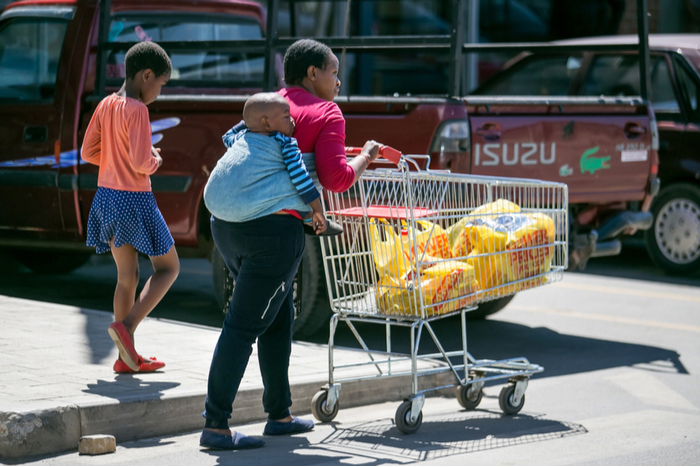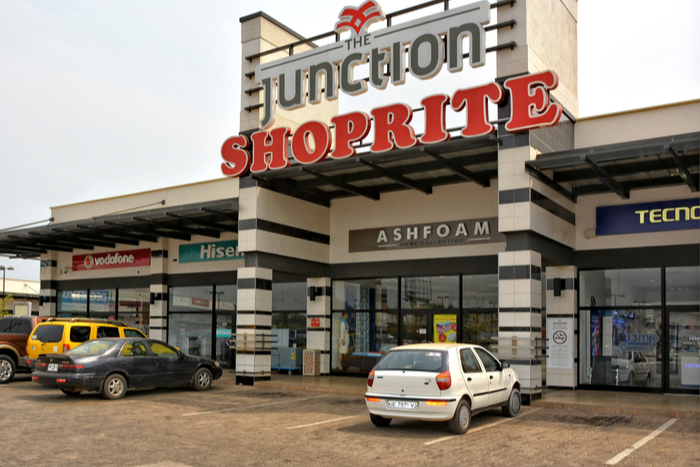The South African economy is forecast to expand by 3.6 per cent this year, despite the Covid-19 pandemic. However, the figure is 0.1 per cent down from last month’s forecast, and 2.5 per cent in 2022, according to Focus Economics.
The retail sector in Africa has been one of the biggest success stories of the past decade, driven initially by a consumer boom in a handful of high-growth economies, demographics and a growing middle class. While South African retailers have ridden this wave, last October the World Bank said the country was expected to see weak recovery in 2021.This is due to high unemployment figures at the hands of Covid-19, which could weigh on the country’s economic growth.
In a 2019 Statista report, South Africa’s GDP was worth $350 billion (£251.4 billion). It was ranked as the second highest on the African continent – after Nigeria – with the retail sector representing about 14 per cent of the total GDP.

“In the first quarter of 2020, South Africa’s official unemployment rate rose to 30.1 per cent – one of the highest in emerging-market economies and leading to an estimated economic contraction of seven per cent in 2020 overall,” said Stewart Morrison, managing director of global marketing agency Firm Decisions.
“As South Africa is an emerging market, social and income inequalities are very high.
“South Africa suffers among the highest levels of inequality in the world, with high unemployment, especially among young people.”
Trevor Goott, director of Africa at global merchant acquirer Unlimint, argued that the South African retail climate had shown signs of improvement after the devastation caused by its first nationwide lockdown in 2020.
“It is under immense pressure though, people have less money to spend owing to the negative financial consequences of the pandemic, and resultant lockdown,” he said.

On March 27 last year, the South African government introduced tough lockdown restrictions – much like many other countries around the world did as the Covid-19 crisis escalated around that time. Borders were shut to international travellers, schools were closed, alcohol was banned and people were told to stay at home.
To ease the economic pain, the government began a gradual reopening in June, but restrictions were reintroduced in July as infection rates began to rise again. A state of emergency was declared effective until August 15, and another lockdown was reintroduced at the end of December at the peak of the second wave.
In November, data revealed that South Africa’s retail trade slumped four per cent from a year earlier, following an upwardly revised 2.3 per cent decrease in the previous month, according to Trading Economics. It was the eighth consecutive month of decrease in retail and at the quickest pace since August. Sales had fallen across the retail industry by 26.5 per cent a month prior in October.
Before the pandemic, South Africa’s retail sales had increased 1.2 per cent year-on-year. This was recorded in January 2020, following an upwardly revised 0.5 per cent fall in December and beating market expectations of a 0.3 per cent rise.
South Africa is also arguably the more developed and larger modern retail market in sub-Saharan Africa. The country has shopping malls covering over 269,000,000sq ft of retail gross leasable area, compared with only about 53,000,000sq ft in the rest of sub-Saharan Africa.
The market continued to grow in 2019 with the expansion of the Fourways Mall, which included the addition of 968,000sq ft to the centre, which now has approximately 1.8 million sq ft – making it the largest shopping centre in southern Africa.

The South African trade industry is made up of five divisions: wholesale, motor, accommodation, food and beverages (i.e. restaurants and catering), and retail.
The five biggest retailers in South Africa – according to experts – are Shoprite, Spar, Pick n Pay, Woolworths (not to be confused by the UK’s collapsed Woolworths chain, nor Australia’s supermarket chain) and Massmart, which is owned by US retail behemoth Walmart.
Shoprite is Africa’s biggest supermarket chain as well as one of the first. Its first move outside South Africa and its immediate neighbours Lesotho, Swaziland, Namibia and Botswana had been to Zambia in 1995, where it opened a further 17 stores in less than a decade.
It opened its first store in Nigeria in 2005 and by 2018 it had 25 stores across the country. Currently, it has operations in 13 African countries outside of South Africa.
Meanwhile, South African supermarket giant Pick n Pay has set up stores all over southern Africa.

Goott said South African retailers have a history of expanding internationally to pursue growth – with mixed results.
“The problem is that these successful retailers outgrow their market in South Africa, and must turn to new mature markets if they wish to expand,” he told Retail Gazette.
“In most instances, this has not been successful. One of the biggest disappointments was Woolworths’ entry into Australia.”
Indeed, Woolworths paid £1.2 billion for Australian department store chain David Jones in 2014, and has since written off about R12 billion (£59 million) – 57 per cent of its investment.

Last year, Shoprite’s shares fell to their lowest level in more than three years after the company disclosed a 20 per cent drop in earnings, driven largely by poor performance and currency problems in its non-South African operations.
It is now closing unprofitable stores in its rest-of-Africa operations while rationalising its expansion plans in what it called “persistently challenging trading conditions”. In a statement released on August 2, Shoprite announced that it was considering “all, or a majority stake in” its Nigerian subsidiary, Retail Supermarkets Nigeria Limited.
Meanwhile, just recently, Truworths – which owns UK-based shoe chain Office among others – reported a seven per cent decline in half-year profit on Thursday.
The fashion retailer announced in September that it was planning to launch new store concepts in South Africa, some of which are speciality stores, focusing more on young, casual ranges and putting everything online in order to grow profits and stay relevant in a rapidly changing climate.
If there are no further lockdowns in South Africa for the remainder of its financial year, which started in July, Truworths expects sales to increase in the second half.
On the other hand, Office’s trading space will decrease by about 22 per cent in the 2021 financial year, as it continues to close marginal and unprofitable stores as part of its turnaround plan.
Separately, 2017 saw one of the biggest corporate fraud incidents when South African conglomerate Steinhoff – which currently owns the Pepco Group, which in turn owns Poundland in the UK – was embroiled in an accounting scandal.
Steinhoff admitted to accounting irregularities in December 2017, which prompted a huge scandal and saw the sudden resignations of chief executive Markus Jooste and chairman Christo Weise. Prior to this, Steinhoff was valued at R193 billion (£9.4 billion). That all changed overnight when it nosedived by R117 billion (£5.7 billion).
The Steinhoff crash wiped more than R200 billion (£9.7 billion) off the Johannesburg Stock Exchange, erased Wiese’s wealth by more than half and knocked the pension funds of millions of South Africans. The scandal also saw shares in Steinhoff – which is listed in both the Johannesburg and Frankfurt stock markets – nosedive by more than 90 per cent.
Two years later in March 2019, Steinhoff confirmed it had overstated profits between 2009 and 2017 by $7.4 billion (£6.1 billion). By July that year, the group was still suffering after reporting a €356 million (£315 million) half-year loss as the damage from the accounting scandal dragged on.
However, Steinhoff said its Pepco arm was a driving forces behind a sales rise. Based in the UK, Pepco had changed its name from Pepkor Europe in September 2019 as it worked towards improving links between its Poundland, Pepco and Dealz fascias across Europe. It denied at the time that the rename had anything to do with immediate IPO plans. Pepco also stressed that it had little financial dependency on Steinhoff.
The impact of the accountancy scandal continued when Steinhoff said in August it would sell off assets in order to cut debt, as it was “the only way” for the business to stay alive. The following November, Steinhoff sold Blue Group, the parent company of UK retailers Bensons for Beds and Harveys, to Alteri Investors for an undisclosed sum. Blue Group had been separate from Pepco.
“South Africa has a highly competitive retail market”
Back in 2013, South Africa witnessed a boost to its retail sector after the corporate buyout of Massmart by Walmart, the world’s largest retailer.
The $2.4 billion (£1.7 billion) deal gave Walmart access to over 50 million new customers. With this foothold in the African retail industry, Massmart leaders launched a pilot store in Nigeria in 2014 that was designed to directly compete with Africa’s largest domestic retail chains: Shoprite, Pick n Pay, and the Spar Group.
South African department store Game was acquired in 1998 by Massmart, and since Walmart’s acquisition, Game has expanded to 12 countries.
Kyle Harbinson, partner at tech consultancy REPL Group, said South Africa has a highly competitive retail market, with a sophisticated set of both local and international retail brands.
“Low income South Africans are savvy consumers who are likely to pay more attention to prices than prioritising brand loyalty, while higher income South Africans are technology savvy shoppers who value quality and convenience,” he argued.
“South African retail is in a tough place – where it once had bustling shopping malls, these have now been replaced with quiet places where remote working Zoom calls can be taken.
“The latest lockdown, imposed on the December 28, included an alcohol ban and curfew that has further impacted many jobs. All of which factors mean that consumers are being very thrifty with their purchasing habits and only buying the essentials.
“South Africa has some of the highest levels of income inequality in the world. This means that the average South African consumer would not be representative of reality, and South African retailers have focussed their customer propositions on this basis.”
Stewart Morrison agreed. He said that due to minimal increases in wages and rising prices, consumers have tight budgets.
“Consumption is not as massive as in Western countries and South Africans tend to watch their finances and curb spending,” he told Retail Gazette.
“Purchases are increasingly made at discounters or using different channels. Modern retailers are no longer preferred to small traders and informal traders.”
Morrison further argued that South Africa has a rigorous labour market with the labour laws being one of the reasons why many international businesses do not invest in the country.
“South Africa has a diverse workforce ranging from the unskilled to very accomplished and skilled. Due to the social and income inequalities, crime in the country is high which makes security costs for businesses operating in South Africa a major cost item,” he said.
“Retailers offering their own credit facilities to consumers are facing difficult times due to job losses and non-payment.
“Retailers that have launched in the South African market not too long ago are doing better than the established retailers because they do not offer credit and the prices of their products are appealing and affordable to the consumers that are facing a reduction in their disposable incomes.”
Click here to sign up to Retail Gazette‘s free daily email newsletter
The post Market Snapshot: South Africa appeared first on Retail Gazette.
from Retail Gazette https://ift.tt/3pUJdhU
via IFTTT
Comments
Post a Comment